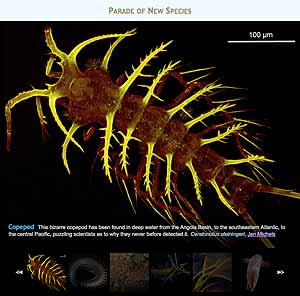Our mission is to explore life beneath the seafloor and make transformative discoveries that advance science, benefit society, and inspire people of all ages and origins.
In a provocative 1992 essay, Thomas Gold postulated the existence of a "deep, hot biosphere", supported by geological energy sources. The potential for the oceanic deep biosphere to influence global biogeochemical processes scales with the size of the subseafloor as a habitat.
See: Probe Earth's Interior with Advanced Radiation Sources
The ramifications of a massive buried biosphere of "intraterrestrial microbes" are significant, leading to paradigm shifts in our thinking in the biosciences and geosciences.
"Despite an intense focus on discovering abiotic hydrocarbon sources in natural settings, only a handful of sites convincingly suggest that abiotic organic synthesis occurs within the geosphere...
...The crux of this topic is that currently there is no foolproof approach to distinguishing abiotic versus biotic organic synthesis. Thus, it is especially important to be cognizant of the possibilities and limitations of abiotic hydrocarbon production when considering a deep subsurface biosphere where the organic matter may be synthesized by both abiotic and biotic processes." (Proskurowski, 2010)
See: Life in the Oceans | The Why Files.
See: The Sloan - Deep Carbon Observatory (DCO)
The Deep Carbon Observatory is a program of the Carnegie Institution for Science, Alfred P. Sloan Foundation, and the Carnegie Institution of Washington.
The Sloan - DCO mission includes the fostering of international cooperation in addressing global-scale questions, including the nature and extent of deep microbial life, the fluxes of carbon dioxide from the world's volcanoes, and the distribution and characteristics of deep hydrocarbon reservoirs.
The DCO is currently composed of four science directorates: Deep Life; Reservoirs and Fluxes; Energy, Environment, and Climate; and Physics and Chemistry of Carbon.
Gold, Thomas. The Deep Hot Biosphere : The Myth of Fossil Fuels. New York: Springer | Copernicus, 1998.
Goncharov, Alexander. “Unanswered Questions in Deep Carbon Research” presented at the 2009 Annual Meeting keynote | Sloan Deep Carbon Cycle Workshop, Carnegie Institution, Geophysical Laboratory | Washington, D.C., May 15, 2008. (PDF 4.4 MB)
Proskurowski, G. “Abiogenic Hydrocarbon Production at the Geosphere-Biosphere Interface via Serpentinization Reactions” in Timmis, Kenneth N., ed. Handbook of Hydrocarbon and Lipid Microbiology. Berlin, Heidelberg: Springer, 2010.








